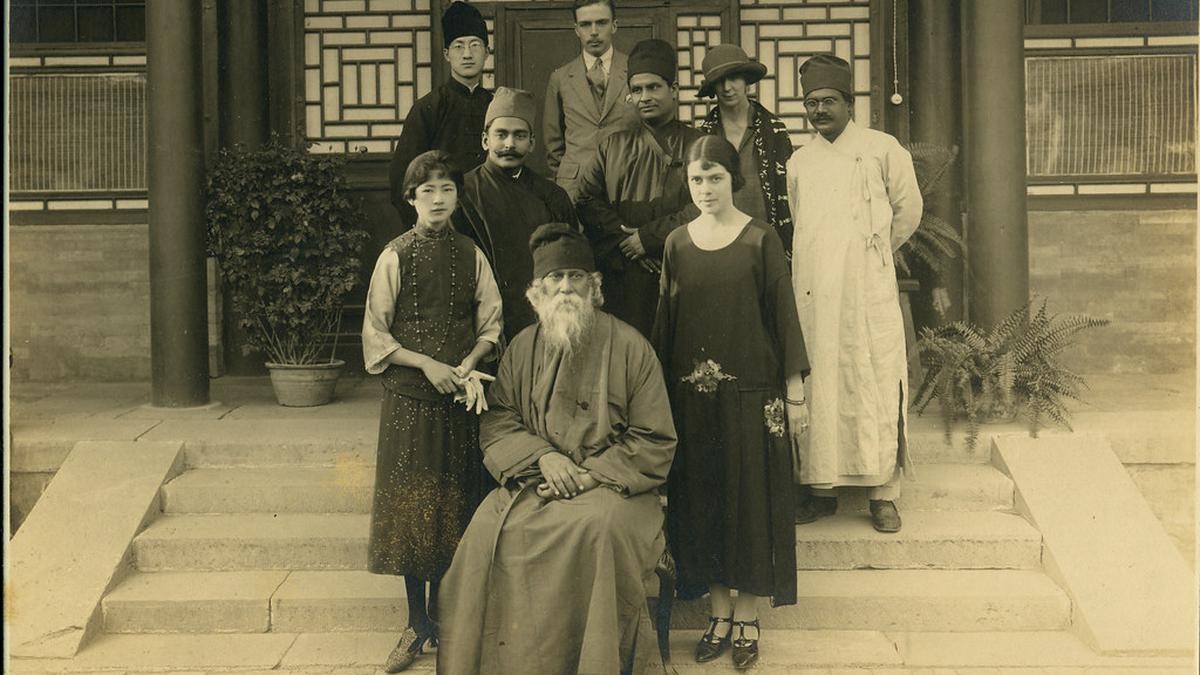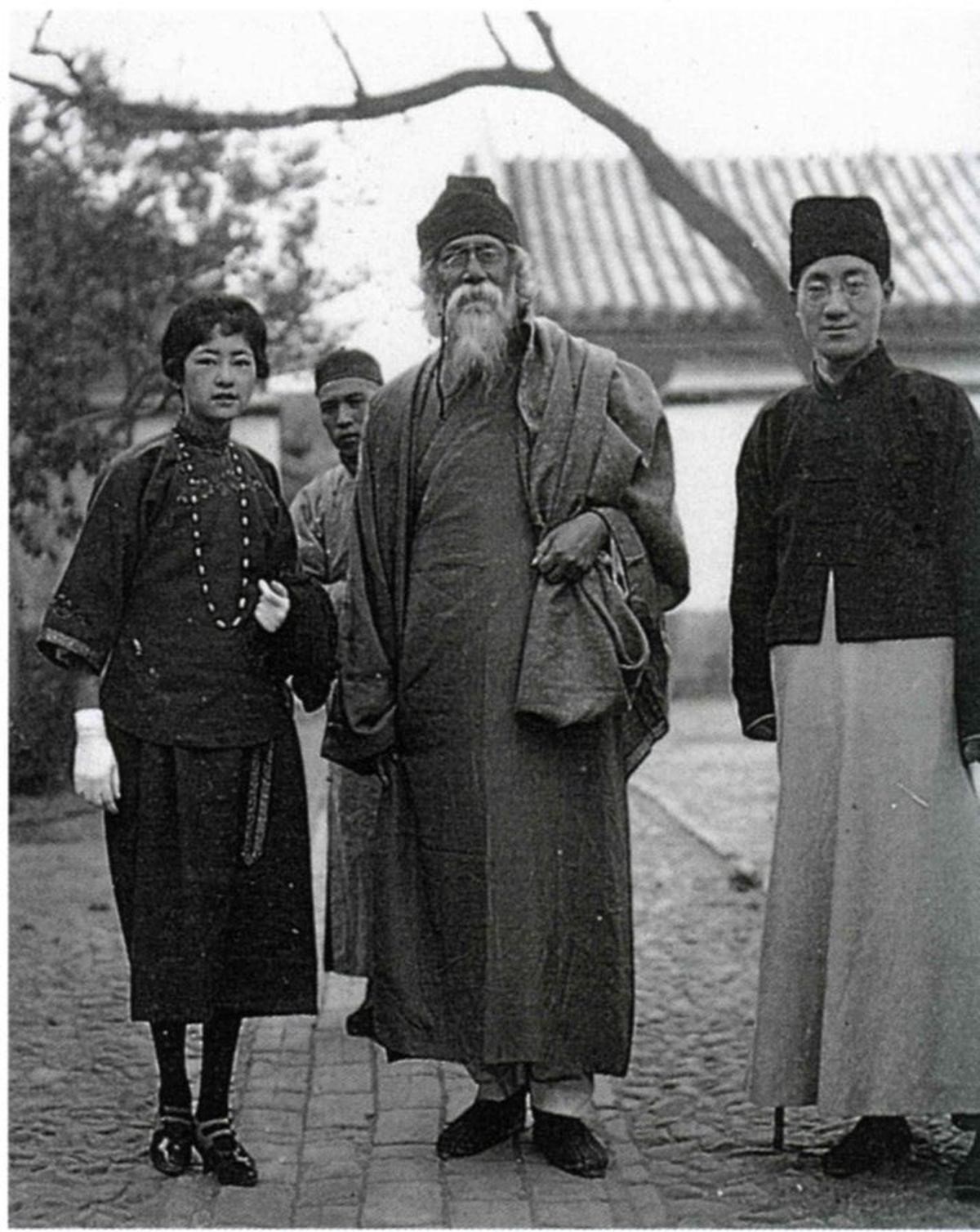
Forum in New Delhi sees calls for upholding the legacy of friendship associated with renowned poet and scholar
The Sino-Indian friendship and cultural ties championed by the renowned Indian poet, writer, philosopher and educator Rabindranath Tagore is an important legacy that is more vital than ever in the present times, say scholars.
At a conference organized in New Delhi last week to commemorate the 100th anniversary of Tagore's maiden visit to China, Indian and Chinese scholars said Tagore’s legacy can help deepen relations and serve as a bridge to foster understanding and mutual respect between the two big Asian neighbors.
The forum, on Sept 24, came as a seven-day exhibition on Tagore’s China ties kicked off that day at the India International Centre in New Delhi, showcasing priceless photos of Tagore with prominent Chinese scholars and Tagore’s valuable writings about China.
Participants unanimously vowed to carry forward Tagore’s legacy to strengthen India-China cultural links, saying that they believe that by doing this the two countries can strengthen ties, boost people-to-people exchanges and usher a new era in relations between the two sides.
In today's world, marked by deep divides, polarization and geopolitical challenges, Tagore’s legacy acts as a link to strengthen relations between China and India, and it promotes mutual respect and understanding, Huang Yinghong, a Chinese scholar on Tagore, said on the sidelines of the conference.
ALSO READ: Ambassador encourages Indian youths to visit China and increase exchanges
Huang, a professor at O. P. Jindal Global University in India’s northern Haryana state, said Tagore’s legacy can help deepen bilateral relations significantly and expand the ties at multiple levels, including cultural exchanges, people-to-people exchanges, and academic exchanges.
The conference, titled “A Memorable Encounter: Significance for Civilizational Dialogue in the Contemporary World”, was organized by the Institute of Chinese Studies (ICS) in New Delhi, in collaboration with the IIC and Cheena Bhavana, Visva-Bharati University, West Bengal; Gandhi Global Family; and Centre for Chinese & South East Asian Studies, Jawaharlal Nehru University, New Delhi.
On April 12, 1924, at the invitation of the Chinese Cultural and Literary Society, Tagore embarked on his first trip to China. The visit took him to Shanghai, Hangzhou, Nanjing, Jinan, Peking (now Beijing), Taiyuan, Hankou and other places. Tagore was received by Liang Qichao, one of China’s foremost intellectuals of the time.
During his nearly 50-day stay from April 12 to May 30, Tagore delivered numerous speeches and talks, facilitating cultural exchanges between China and India and further enriching the history of friendly interactions between India and China.
Tagore’s visit to China in 1924 enabled a “truly a wide-ranging Sino-Indian civilizational dialogue” and it was “an important turning point in the history of Sino-Indian cultural exchange,” said Wei Liming, a professor at the Department of Asia-Pacific Studies, Peking University in Beijing.
Wei is organizing events at Peking University to mark the centenary of Tagore’s visit and promoting Tagore’s spirit among the students of the university.
READ MORE: Bengaluru exhibits highlight Tagore’s spirit for Indo-China friendship
Wei was among the Chinese scholars who attended the Sept 24 conference in New Delhi. Other guests included Professor Huang Rong from the Centre for India Studies at Shenzhen University and Professor Xiao Xingzheng from Xiamen University.
“By studying Tagore’s poems, literature, paintings and research work, we can further strengthen mutual learning between Chinese and Indian civilizations, deepen academic exchanges, enhance understanding and mutual trust,” Huang Rong said after the conference.
By revisiting Tagore's contributions, India and China can find common ground in their shared cultural heritage, the professor added.
According to organizers, the conference aimed to highlight the deep cultural ties and mutual influence between India and China, foster greater understanding and dialogue between the two peoples, and explore the lasting impact of Tagore's philosophy.
Tagore’s ideas continue to be of great relevance, and the forum offered an opportunity to revisit his thoughts. It is hoped that the people of India and China will contribute to usher in a new era based on principles of peace, justice and equity, and join hands as advocated by Tagore and other Chinese scholars hundred years ago, organizers said at the conference.
The exhibition, meanwhile, showcases Tagore’s friendships with Chinese scholar Tan Yun Shan, who taught at Visva-Bharati University that was founded by Tagore in Santiniketan, West Bengal; Bing Xin, one of the major writers of modern China; Xu Zhimo, a Chinese poet who acted as a guide and interpreter during Tagore’s stay in China; and eminent Chinese painter Xu Beihong. Xu Beihong visited India in 1939 following an invitation from Tagore and stayed for over a year.

The exhibition displayed priceless letters written by Tan Yun Shan and Xu Zhimo to Tagore.
Bing Xin visited India in 1953. Her poetry style was deeply influenced by Tagore. She translated Gitanjali, a collections of poems by Tagore, into Chinese taking close to ten years to finish the task. The translated version was published in 1955, according to an archival document displayed at the exhibition.
The exhibition was dedicated to the memory of Tan, a Chinese scholar and a great friend of Tagore and a leading figure in the history of Sino-Indian relations. Tan met Tagore in Singapore in 1927, and visited Santiniketan. In 1937, Tan greatly helped Tagore in founding Cheena Bhavan, a center of Chinese studies and culture at Visva-Bharati University.
Kaushik Ghosh, a visitor at the exhibition, said that before visiting the exhibit he was not aware that Tagore had fostered a profound intellectual and cultural exchange between India and China, and that numerous works of Tagore are equally well regarded in China.
Civilizational dialogue was the central essence of Tagore’s message to the whole world; that all civilizations must continue the dialogue with each other. Therefore, people of both countries must remember Tagore’s great contribution to India-China civilizational dialogue, said Manoranjan Mohanty, who had served as a professor of political science and director of the Developing Countries Research Centre, the University of Delhi.
READ MORE: Xi's India trip bolstered long-standing friendship
People-to-people interactions always provide new insights and new frameworks in resolving border disputes or trade disputes because the disputes are of recent origin, Mohanty said after the conference. Tagore’s ideology can unite the two countries very intimately once again, Mohanty emphasized at the conference.
Sreemati Chakrabarti, chairperson of the ICS, said if India and China both approach one another with a civilizational mindset, much can be achieved. Hence the effort to rediscover Tagore by Indian and Chinese scholars is an important effort, Chakrabarti said.
Speaking at the conference, K. N. Shrivastava, director of the IIC, said the legacy or spirit fostered by Tagore and Chinese scholars in the past can help overcome the current geopolitical crises and dispel distrust in bilateral relations.
The whole world should carry forward this legacy, Shrivastava said, adding that it will not only be good for India-China relations but also for world peace.
“This is, indeed, a great day for me, a day long looked for, when I should be able to redeem, on behalf of our people, an ancient pledge implicit in our past, the pledge to maintain the intercourse of culture and friendship between our people and the people of China, an intercourse whose foundation was laid eighteen hundred years back by our ancestors with infinite patience and sacrifice,” Tagore said in Santiniketan after the foundation of Cheena Bhavan in 1937, according to the book Tagore and China.
The writer is a freelance journalist for China Daily.


